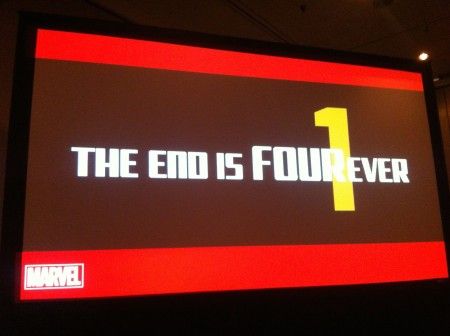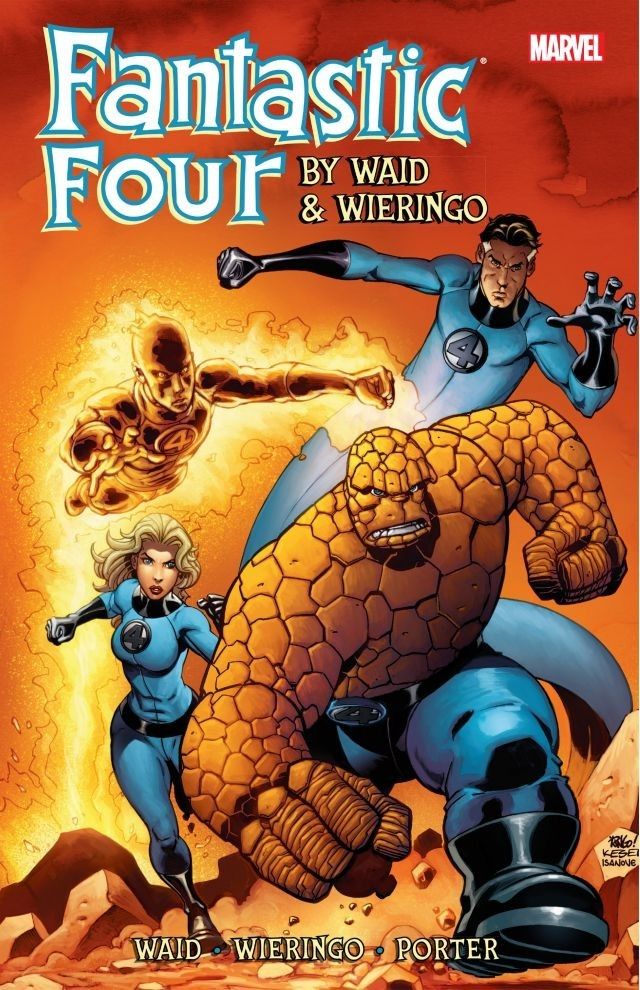Here we go again.
According to a distributor listing for June 2015 (are we really looking that far ahead now?), James Robinson and Leonard Kirk's current run on Marvel's Fantastic Four will be released in a collection called Fantastic Four Vol. 4: The End is Fourever that includes a "Triple Sized Final Issue 645". Sighted today at New York Comic Con during a retailer presentation was a big logo for the James Bond-esque title, but there was little other information. Maybe we'll get an announcement while you're reading this article, so follow CBR's comprehensive coverage of NYCC (cheap plug)!
There have been rumors about Marvel ending the Fantastic Four (and possibly the X-Men) to spite Fox, which owns the film rights to both properties effectively in perpetuity, but that seems petty. Who opens a comic and asks, "I wonder what this licensing property will do this week?" We read comics for the stories, characters and creators; corporate politics is probably the last thing fans want to think about while (hopefully) enjoying the latest issue. And people are still opening up new issues of Fantastic Four, as the book's sales are pretty steadily in the 28,000 range these past two months. Not Batman numbers, but still ...
So why do we hate this book? Every time I hear about how important the Fantastic Four are, it's always lip service in articles about how the team will be destroyed or the book is getting canned. The two major arcs I can think of off the top of my have all revolved around death: Jonathan Hickman brought the book into the spotlight by killing off Johnny Storm, and Matt Fraction upped the ante and threatened the whole team with cosmic radiation poisoning. Robinson is now systematically destroying the family unit, along with its credibility. Fantastic Four #5 was difficult to read, as Reed and Sue were taken to court, losing their home and their children due to endangerment. We all know being a superhero is dangerous, but to take matters into the "real world" and penalize Marvel's First Family for being fantastic is just sad. Maybe preparing to cancel the book is a small mercy.
In 2002, Mark Waid might have agreed with that sentiment. So starts his introduction to the hardcover collection of his landmark run with Mike Wieringo. The writer fully admits to the lip service you're supposed to give when approached with this kind of a project, and, "while I'd always had an appropriate respect for the series given its legendary stature, that was the head talking and not the heart." But, bolstered by the enthusiasm and honest love for the Fantastic Four from Wieringo, editor Tom Brevoort and inker Karl Kessel, and his own discovery of the adventures and characters therein, Waid grew to love them as well. And so began what I honestly consider some of the finest work in the careers of Waid and Wieringo. Their 36-issue run (Wieringo on art for 27 of those issues) is as important to me as John Byrne's, or even Stan Lee and Jack Kirby's. Those issues hold the key to finding these characters relevant and making readers fall in love with what makes this book, above all other Marvel titles, so special.
Every issue is full of life, as the Fantastic Four are people first, heroes second. Each member is distinct and has his or her own personality and goals outside of the team, but is bolstered and made richer by the family unit. I know "Marvel's First Family" is kind of their slogan, and it gets cliche, but those bonds really come through in the Waid/Wieringo run. All of their adventures are fantastic; Waid calls them "imaginauts," bringing all the high science-fiction of their stories to an almost Disney-like wonder. No one goes to Tomorrowland and thinks, "Yes, this is an accurate depiction of the future." We go there because of the creativity and imagination it takes to put it together. And because Star Tours is awesome. Waid/Wieringo's Fantastic Four is AWESOME. The adventures are clever (a living equation menaces the family!) and terrifying (Doctor Doom scares a blind child with just his presence!), and full of heart and humor. All of their stories are like Kirby Krackle, a spice to showcase the heroes themselves, who always shine through.
The Fantastic Four are not landmarks. Mount Rushmore is important, but no one wants to live there. The Fantastic Four are not licenses, either, and shouldn't be showcases as property to the public. Whatever Fox makes in 2015 is going to be its own universe, an Ultimate title if you will, and will have to survive on its own merit. Our comic books shouldn't have to suffer for the movie to succeed or fail. And, this is going to sound awkward, but the Fantastic Four are not legends, either. They're important to the history of Marvel Comics, but they shouldn't be sacrosanct. Waid paraphrases Kirby in that Fantastic Four hardcover, saying "Don't COPY me. You're just short-changing YOURSELF ... when your vision is pointed backward instead of forward. You want to HONOR me ... don't do what I do. Do what YOU do."
Legends are how people remember you. Be fantastic now.


